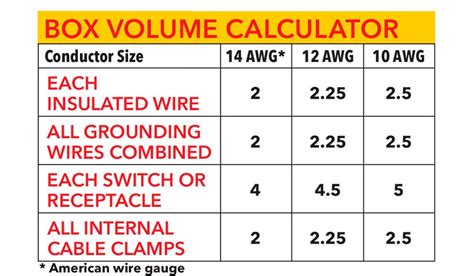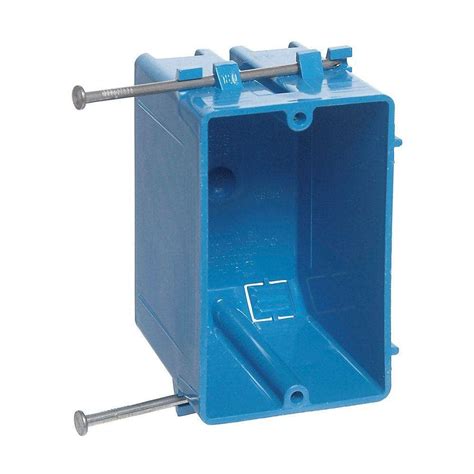electrical switch box sizes Prepare the Electrical Box Opening in the Wall . Create the wall cutout. Position . Here we collect the metal strength chart (tensile, yield strength, hardness, and density included) and mechanical properties chart of common metals of different grades for your reference.
0 · standard size electrical boxes
1 · standard electrical box size chart
2 · electrical switch and outlet box
3 · electrical outlet boxes sizes
4 · electrical metal box size chart
5 · electrical box size chart
6 · electrical box chart
7 · dimensions of electrical outlet box
$129.92
Standard rectangular boxes, or single gang boxes, are used for single light fixture switches and outlet receptacles. They are generally about 2 inches wide by 4 inches tall, and their depths range from 1-1/2 inches to 3-1/2 inches. Standard rectangular boxes can be metallic or .When you install an electrical box, make sure it is flush with the surface of this .
Contact between an attached device (such as a light switch or outlet) and the metal .

Prepare the Electrical Box Opening in the Wall . Create the wall cutout. Position .Correct fill capacity: The junction box should be large enough to contain the wires. .
To install this type of clamp, insert the threaded end into a knockout hole in the .There is a huge selection of electrical boxes, varying by size, shape, mounting device, and composition. One of the first distinctions to note is that of new work boxes and remodel or cut .
standard size electrical boxes
Electrical Boxes vary in size, material, number of gangs, and shape and are designed for specific uses like junctions, outlets, and switch or fixture boxes for wiring in wall or ceiling. Use this .

Wires, receptacles and switches need adequate space. Crowded boxes can damage wires, resulting in a fire or shock hazard. You can use the chart below to calculate the .The size switch box depends on the number of switches & sockets which are to be mounted on it. Switch boxes are available in following sizes – 3”x3”, 3”x4”, 3”x6”, 3”x8”, 6”x6”, 6”x8” -where first digit is the height of box & second digit is .
The National Electrical Code (NEC) provides guidelines for box sizing based on the number and size of wires you're working with. The NEC specifies the minimum volume of the box in cubic inches (cu. in.) that you .
Switch Boxes. If you’re not necessarily a fan of the junction box and its bulky frame, then a switch box might be a bit better for you. These outlet boxes provide a more organized alternative to junction boxes, allowing you to .
standard electrical box size chart
Whether you are working in your garage, attic, or kitchen you need to know that there is a limit to how many wires you can safely place in an electrical box. Keep in mind that not all electrical boxes are the same size. .
By understanding the standard electrical box sizes, you can select the appropriate box for your specific electrical applications, ensuring a safe and compliant installation. Always consult a qualified electrician for proper . Standard rectangular boxes, or single gang boxes, are used for single light fixture switches and outlet receptacles. They are generally about 2 inches wide by 4 inches tall, and their depths range from 1-1/2 inches to 3-1/2 inches. Standard rectangular boxes can .
There is a huge selection of electrical boxes, varying by size, shape, mounting device, and composition. One of the first distinctions to note is that of new work boxes and remodel or cut-in boxes.Electrical Boxes vary in size, material, number of gangs, and shape and are designed for specific uses like junctions, outlets, and switch or fixture boxes for wiring in wall or ceiling. Use this guide to determine the best electrical box choice for your application.
Wires, receptacles and switches need adequate space. Crowded boxes can damage wires, resulting in a fire or shock hazard. You can use the chart below to calculate the required box size. Add up the numbers for the correspond- ing components in the box to find how many cubic inches you’ll need. Single-gang boxes hold one electrical device, such as a switch or receptacle. Double-gang boxes accommodate two electrical devices side by side. For larger installations, you can find boxes that accommodate three or more devices.
The size switch box depends on the number of switches & sockets which are to be mounted on it. Switch boxes are available in following sizes – 3”x3”, 3”x4”, 3”x6”, 3”x8”, 6”x6”, 6”x8” -where first digit is the height of box & second digit is width of box in inches. The National Electrical Code (NEC) provides guidelines for box sizing based on the number and size of wires you're working with. The NEC specifies the minimum volume of the box in cubic inches (cu. in.) that you need to accommodate your wires. Switch Boxes. If you’re not necessarily a fan of the junction box and its bulky frame, then a switch box might be a bit better for you. These outlet boxes provide a more organized alternative to junction boxes, allowing you to keep your electrical components safely and in a tidy manner. Whether you are working in your garage, attic, or kitchen you need to know that there is a limit to how many wires you can safely place in an electrical box. Keep in mind that not all electrical boxes are the same size. The National Electric Code.
electrical switch and outlet box
By understanding the standard electrical box sizes, you can select the appropriate box for your specific electrical applications, ensuring a safe and compliant installation. Always consult a qualified electrician for proper guidance and adhere to . Standard rectangular boxes, or single gang boxes, are used for single light fixture switches and outlet receptacles. They are generally about 2 inches wide by 4 inches tall, and their depths range from 1-1/2 inches to 3-1/2 inches. Standard rectangular boxes can .

There is a huge selection of electrical boxes, varying by size, shape, mounting device, and composition. One of the first distinctions to note is that of new work boxes and remodel or cut-in boxes.Electrical Boxes vary in size, material, number of gangs, and shape and are designed for specific uses like junctions, outlets, and switch or fixture boxes for wiring in wall or ceiling. Use this guide to determine the best electrical box choice for your application. Wires, receptacles and switches need adequate space. Crowded boxes can damage wires, resulting in a fire or shock hazard. You can use the chart below to calculate the required box size. Add up the numbers for the correspond- ing components in the box to find how many cubic inches you’ll need. Single-gang boxes hold one electrical device, such as a switch or receptacle. Double-gang boxes accommodate two electrical devices side by side. For larger installations, you can find boxes that accommodate three or more devices.
The size switch box depends on the number of switches & sockets which are to be mounted on it. Switch boxes are available in following sizes – 3”x3”, 3”x4”, 3”x6”, 3”x8”, 6”x6”, 6”x8” -where first digit is the height of box & second digit is width of box in inches. The National Electrical Code (NEC) provides guidelines for box sizing based on the number and size of wires you're working with. The NEC specifies the minimum volume of the box in cubic inches (cu. in.) that you need to accommodate your wires. Switch Boxes. If you’re not necessarily a fan of the junction box and its bulky frame, then a switch box might be a bit better for you. These outlet boxes provide a more organized alternative to junction boxes, allowing you to keep your electrical components safely and in a tidy manner. Whether you are working in your garage, attic, or kitchen you need to know that there is a limit to how many wires you can safely place in an electrical box. Keep in mind that not all electrical boxes are the same size. The National Electric Code.
metal fabrication in grand junction
metal fabrication industry valuation us
$26.95
electrical switch box sizes|electrical outlet boxes sizes